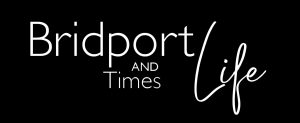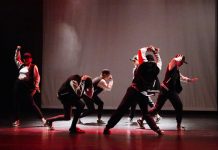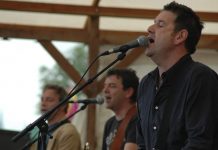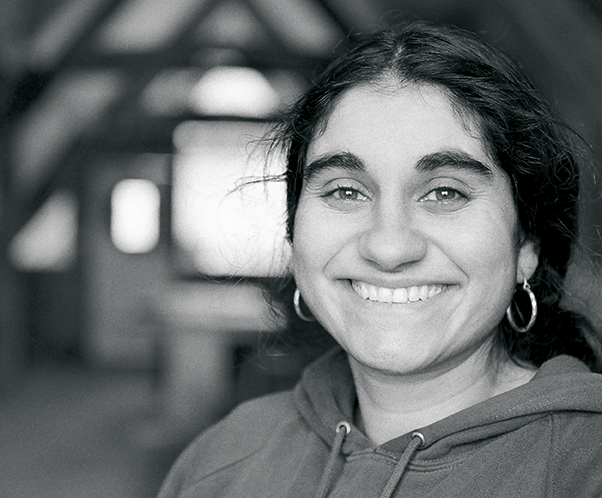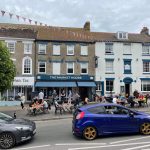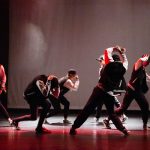‘My life started in Iowa, in the Mid-West of the USA. My mother was Italian-American: her family had once been homestead farmers in Iowa, and my Dad was Indian, from a village in Goa. He was the first in his family to get an “education”, immigrating as an engineer to the US for a better life, maybe a bit of the American dream. Later we moved to Louisiana in the South, bible-belt country, where he spent years working on inventions to help the rural poor. My background’s not really a rural one: you could say more of an activist one.
My mother was blind, and quite early on she decided that wasn’t going to stop her from leading a normal life. She not only raised five of us kids, but also set up a civil rights movement for blind people in the United States. I remember my parents, as a mixed race couple, during my growing up years in Louisiana where there were quite a lot of racial problems, battling for justice in everything they did. My mother was into things like natural childbirth, and chose home births when at the time they were illegal in Louisiana. A burning cross was placed in our backyard once, the local Klan getting upset about us having a home birth to prove it was possible. She didn’t let that, or anything, stop her. I think it was from working alongside my mother I learned that if there’s something you really believe in, and you’re prepared to work for it, you can make things happen. My mother’s campaign had 20,000 members, and became the National Federation for the Blind.
I went to college in Atlanta, Georgia, and studied international development. I had been in the debate team in high school, coming first in the national championship, which brought me a college scholarship. This was a great opportunity to break out of the small town setting I’d been brought up in, because by now I really felt I wanted to achieve something in the world. I was in Atlanta for about 3 years, but began to feel the university was quite conservative in their teaching. The problem with international development, in the way it was taught, was that it seemed to be always about applying the “American path” to developing countries, which I thought was inappropriate. So, I dropped out of college, and began to talk to my father a lot about India: about the village where his family had come from and what their lives were like, and I realized how much he struggled with the consumerism of American culture and missed village life. I felt I needed to find out about Indian life, my father’s background: I didn’t even speak any of their language.
I travelled in India for about a year. The thing that really changed my life was visiting the Narmada Valley, in Gujarat, where there was a hydro-electric dam being built. There was a movement against the project and the environmental destruction it would create, led by activists who were followers of Gandhi’s philosophy. Involved in that movement I felt more passionate, more at home than ever before: I was 20 years old, I was working with people involved in non-violent direct action, who had their own ideas about development, which meant supporting local farmers and communities.
My Indian friends persuaded me that if I wanted to make a difference, I needed credentials, so I went back to university to finish my course. After qualifying, I managed to get a job with President Carter, at the Carter Centre for International Development, in the Latin American section. That was an interesting job, but they were trying to set up trade agreements which would have been detrimental to small farmers. They sent me down to Mexico, where I was able to help set up some cooperatives to help them continue with their traditional Mayan methods of agriculture, but also export just enough to give them money to live on.
It was there that I also discovered how much I loved farming. I’d been doing that for about a year, when I met my husband David. It was at a party in Atlanta: we were across a crowded room, one of those beautiful moments where I fell in love at first sight. He’s British, visiting his brother who lived in Atlanta, and being such a practical man he just swept in and sorted me out. I was living in a yellow school bus at the time, freezing half to death, and right away he put in my wood-stove, and made my life more comfortable.
It wasn’t long before I was pregnant with my first daughter, and we decided that we didn’t want to bring up a child in the city. We both wanted to live on the land: so we moved to a site near Glastonbury, in a beautiful woodland setting, living in a bender where our first child was born. We spent three years there: then we got a truck and lived in that for the next year, working on lots of different organic farms, travelling also to France and Spain. Our second daughter was born in the truck when we were working on a farm in Wales. Later, we moved to an organic farming community in Somerset called Tinker’s Bubble. We were there 5 years, and it was everything we had been looking for while we had been travelling. We had our own bit of land, and there was a great community with down-to-earth people, trying to make a living from land-based enterprises which didn’t use any fossil fuels. It was there that David taught himself to make green-wood furniture, and I learned things like growing vegetables and salad crops, milking cows and making cheese. It was also there that our 3rd and 4th daughters were born, the midwife having to battle her way up the hill to the little round-house we’d built for ourselves. It was an idyllic place for young children to grown up in, and we still feel part of that “family”.
We had been feeling that we needed a bit more land, to make our enterprise a bit more of a commercial proposition. So when we found our 43 acres here at Wootton Fitzpaine, which was for sale at auction, we had no money at all, with just 2 weeks to raise it! Our bank was really supportive, and had faith in how our plan for life on the land was sound. So the day before the auction, they gave us the go-ahead: just before the bidding started, David bit into a piece of bread which, strangely, contained a five-penny piece. “I’m going to buy this farm with all I have in my pocket”, he said, which is this five-penny piece”. To our great joy, our bid was successful. We built our homes here, with our friends Kerry and Olly, who share the farm with us, then started with our poly-tunnels, and vegetable crops. Later we added livestock, producing everything organically and selling mostly through market stalls. The whole enterprise is “off the grid”, meaning we have no need of mains services: we produce our own electricity from wind turbines.
Alongside my work as an organic farmer and a mother, I spend a lot of time campaigning for small farmers and their rights worldwide. In this country that means helping people through the planning system to enable them to live and work on the land. I try to share our own experience of getting permission to build our house to, hopefully, inspire others to do the same. Our own planning struggle was quite a stressful time, but we felt we had a right to live here, to be independent of the state in both housing and income. It can be hard work, but every single day, we enjoy moments of pure joy, affirmations of our way of life.’

